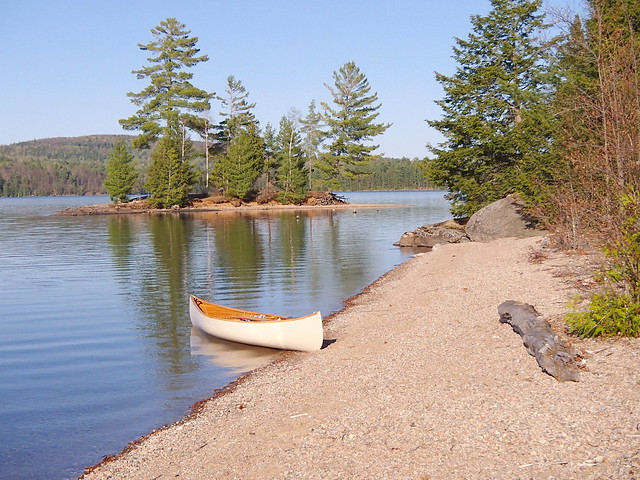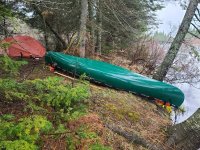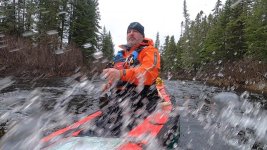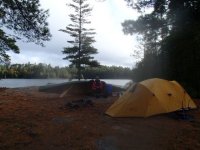Sadie must have some ability now to sniff out the best value in campsites for frogs... my experience with dogs in the canoe has not been good, every one was nervous, anxious to jump out at the first opportunity since staying in the canoe was unfamiliar.
The worst was a beagle (they're known to have runaway tendencies if they sniff something off in the distance) that was on the edge of a small cliff and wanting off. So I paddled in close and the beagle got in. After some time spent paddling back to the access, I stopped at an island to stretch and the first thing the beagle did was jump out and run into the woods. As far away as possible, to the other end of the island. Good thing the island was small and the forest cover was open and not a thrash to retrieve the runaway. The owner's phone number was on the collar and later that night he was glad to hear the news.
A campsite might at first look good or bad, maybe ticking all the boxes or only a few... on a fall trip late Oct, early Nov, I paddled down Grand lake at the NE corner of Algonquin to Clemow. Four campsites there and all looked less than ideal, getting out for inspection. Not good, not much attraction to any of them. The outlet of the lake had been blocked by beavers several years earlier and that killed all the pine trees around the margin of the lake... which looked bad at first, bleached bare trunks and branches looking desolate.
I picked out what seemed the best and settled in... the ground on the small clear spot to pitch a tent was glacial till, everything on the surface from sand to boulders (later finding out it was a glacial drumlin noted for it's geology as a protected earth science feature) so the proper placement for the floor needed to be in exactly the right spot, then lying between exposed boulders)... but proved to be comfortable held in place between the rocks for a good night's sleep.
And the extremely large numbers of dead pines near shore meant that it was easy to find the right-sized logs for sawing up into campfires late into the night. Two nights there, both enjoyable and during the daylight hours there were woodpeckers drumming on the dead trees looking for insects, a very relaxing sound.
The next two nights were a return to Grand where there were more luxurious campsites with much more room for moving around in and pitching a tent, open rocks with views to sit on and good campfire spots... which should have created more enjoyment than the cramped and rough bouldery one at Clemow. But for some reason, the campsite picked out did not provide anything better... something about the sense of being and staying there was not as good... for some unknown reason, whatever it was. Anyway, not that big a deal. On the plus side, there were waterfalls and cliffs and long views and nobody else that late in the year on the much larger Grand lake... so... no complaints.





